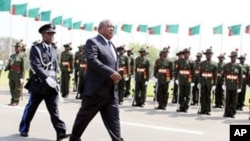The minister for Zambia’s Western Province told VOA the situation in the region is calm following Friday’s deadly clashes between police and activists, who were demanding secession because they say the Zambian government has not done enough to respect some provisions of the Barotseland Agreement of 1964.
That agreement brought Northern Rhodesia and Barotseland together as one country at independence.
Richard Mwapela, provisional minister for the Western region said said Zambia is one country, and no one group has the right to secede.
“The situation in the western province is calm; it’s back to normal. People are able to do their businesses now. The shops are open. The police have managed to bring peace to the province; they have managed to make some arrests of the people who are trying to call for secession,” he said.
Mwapela would not comment directly on the Barotse Agreement except to describe the Barotseland Freedom Movement (BFM), a youth-driven pro-secession grouping, as comprising a few troublemakers.
“As far as I am concerned, I don’t know anything about (the) Barotse Agreement. So, it’s very difficult for me to comment on the Barotse Agreement. As a provisional minister, my role is to make sure there is law and order in the provinces and the rights of the people are protected, and that’s what we are doing,” Mwapela said.
He said Zambia is one country and no one group has the right to secede.
“This is one country; this is one Zambia; there is no right for anyone to call for any secession,” Mwapela said.
Mwapela defended the killing of a man by police during Friday’s clashes.
“The person who was shot wanted to set ablaze a filling station and we were going to lose lots of live. That’s why the police had to come in quickly and get rid of that person that wanted to set ablaze a filling station,” he said.
Meanwhile, Joshua Matali, manager of Radio Lyambeai in the western province, told VOA his station remains closed after it was ordered shut by police for airing a phone-in program on the Barotse Agreement.
“We collected views from members of the public and then we aired those views and, then, when that program was running for the second time, a repeat, it was after that the commissioner of police in Zambia came there. They smashed the door and got into the studio and got our computers and camera equipment,” Matali said.
Acting Zambian Information Minister Dora Siliya banned the Zambia media from airing phone-in programs on the Barotse Agreement. She said the ban is intended to maintain peace in the country.
Matali said he and his staff are surprised by the police move considering that Zambia is supposed to a democratic country where freedom of speech and of the press should reign.
Matali said he and his staff plan to meet Monday with representatives of the Media Institute of Southern Africa who, he said, are due in the western province.




